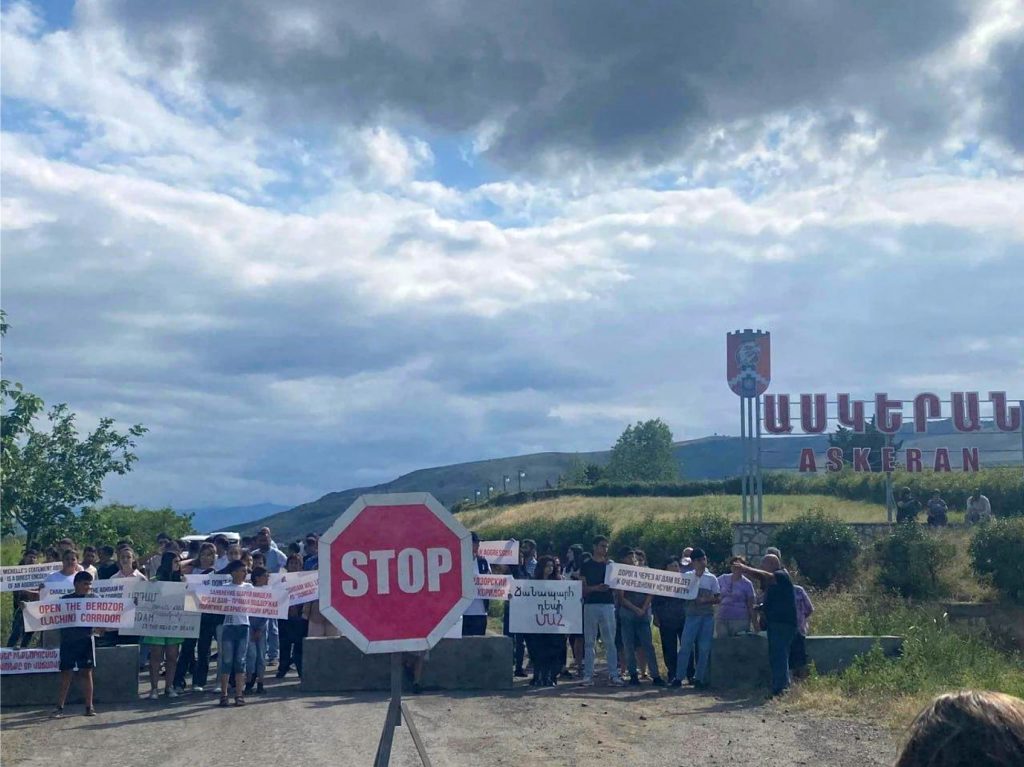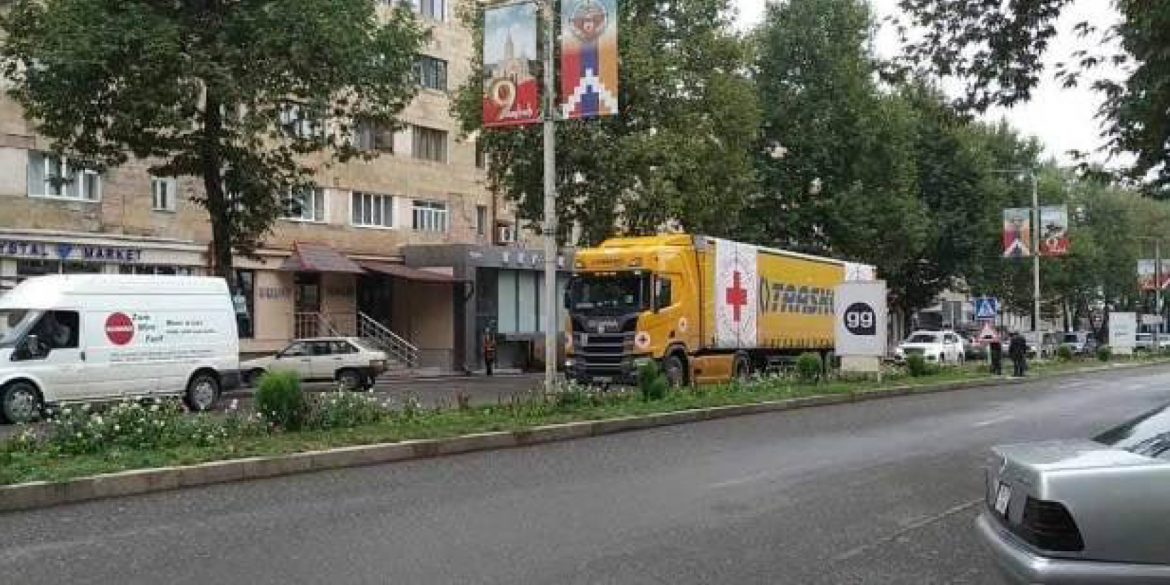YEREVAN – The Berdzor (Lachin) Corridor has not been opened to humanitarian aid as of September 13, despite an agreement to open the route 12 hours after the entry of Russian aid to Artsakh through Aghdam.
More than two years after a trade made by the Armenian and Azerbaijani governments for the return of 15 Armenian prisoners of war in exchange for the maps of the mined areas of Akna (Aghdam), the use of the Aghdam road has become a topic of discussion following Azerbaijan’s complete blockade of the Berdzor Corridor to humanitarian aid in mid-June this year.
On September 9, Artsakh authorities announced that Russian aid would be delivered through the Aghdam road, and an agreement had been reached to restore movement for humanitarian aid through the Berdzor Corridor.
Russian co-chair of the OSCE Minsk Group Igor Khovayev met with Azerbaijan’s President Ilham Aliyev in Baku and presented Moscow’s clear position, according to which no Azeri goods will enter the Armenian-inhabited part of Artsakh.
An agreement was reached stating that very limited products, not of Azerbaijani origin, will be sent through the Aghdam road. According to the agreement, after the Russian aid passes, the Aghdam road will be closed again, and no other vehicles will pass. According to another arrangement, the Berdzor Corridor will be opened 12 hours after the Russian aid passes through Aghdam, and the Armenian trucks will be able to go to Stepanakert.
Since July 26, an Armenian government convoy containing 360 tons of humanitarian aid has been blocked in Kornidzor by the Azerbaijani government. The convoy of nineteen trucks contains flour, pasta, sugar, vegetable oil, powder milk, salt, baby food and medicine.
According to the Artsakh Information Center, “On September 12, the humanitarian cargo entered the Artsakh Republic through the city of Askeran, with the permission of the authorities of the republic, through the Russian Red Cross and the vehicles of that organization. The aid contains vital Russian-made goods.”
Russian aid includes blankets, bed sheets for hospitals, soap, toothpaste, shampoo, baby cereal, vitamins, baby cream, diapers, wet wipes and 11.4 tons of food including flour, sugar, rice, green peas, lentils, corn, pasta, semolina and buckwheat.
The mayor of Askeran, Hayk Shamiryan, mentioned that concerned citizens of Artsakh that were gathered near the Tank Memorial initially protested the entry, but then came to an agreement, after which the Russian Red Cross truck, accompanied by the police, reached the Artsakh capital of Stepanakert.
While the Azerbaijani side had agreed to create conditions for the transportation of humanitarian aid through the Berdzor Corridor 12 hours after the entry of Russian aid through the Aghdam-Stepanakert road, there are no changes thus far.
A statement issued by the Foreign Ministry of Artsakh on June 16 affirms, “The complete closure of the Lachin Corridor, used in a limited mode and exclusively for humanitarian purposes because of the ongoing illegal blockade of Artsakh for more than six months, is another practical demonstration of Azerbaijan’s gross violation of its international obligations, disregard for the fundamental norms of international law, including the legally binding decision of the International Court of Justice. In fact, the illegally established checkpoint in the Lachin Corridor is being used by Azerbaijan purely as a tool to continue its policy of ethnic cleansing against the people of Artsakh.”
After a provocation near Khakari Bridge on June 15, Azerbaijan completely blocked all humanitarian passenger and cargo transportations via the Berdzor Corridor in both directions. As a result of Azerbaijan’s actions, the planned medical evacuation of patients from Artsakh to Armenia by the International Committee of the Red Cross (ICRC) did not take place, and the planned transportation of passengers in urgent humanitarian need through the mediation of the Russian peacekeeping contingent on the Goris-Stepanakert route was canceled. The movement of trucks of Russian peacekeepers en route to Goris to deliver humanitarian goods to Artsakh was also stopped.
The first proposal of the use of the Aghdam road was made on July 14 by Azerbaijan’s Minister of Foreign Affairs Jeyhun Bayramov while meeting with the head of the ICRC representative office in Azerbaijan Dragana Kozic. “As for meeting the needs of Armenian residents, the Azerbaijani side does not rule out the possibility of providing assistance on the Aghdam-Stepanakert road,” stated Bayramov.
According to political analyst Edgar Elbakyan, “It is not the first time that Azerbaijan first terrorizes the Artsakh Armenians, then allegedly extends a ‘helping hand’ as a ‘show of goodwill.’ This is called forced integration. By depriving the Artsakh Armenians of necessary resources, Azerbaijan shows that the faucet is in its hands – Azerbaijan opens and closes the faucet when it pleases, leaving the people of Artsakh to submit to the whims of Azerbaijan.”
Following talks of opening the Aghdam-Stepanakert road and a statement made by European Council President Charles Michel noting Azerbaijan’s willingness to provide humanitarian supplies via Aghdam, a group of Artsakh citizens blocked the road from Askeran to Aghdam by placing concrete barriers on July 18. Signs held by protesters read, “Aghdam is the road of death” and “Charles Michel, the Aghdam road is not a humanitarian corridor.”

In response to the Armenians of Artsakh blocking the road from Askeran to Aghdam, President Aliyev questioned the protestors’ actions, stating, “Why should food be delivered from another country? After all, Karabakh is Azerbaijan, and everyone knows that. Therefore, why should the goods be delivered from another country?”
Encouraged by Aliyev’s statement, his Foreign Policy Advisor Hikmet Hajiyev stated that it is not necessary to politicize the issue and insist on the use of the Berdzor Corridor only, keeping the Aghdam road closed. “There is no alternative to the Aghdam-Stepanakert road and the reintegration of Karabakh Armenians. The game is over,” Hajiyev said.
Baku utilized Michel’s remarks to advance its new narrative and ease the pressure from international actors regarding the unblocking of the Berdzor Corridor. This new reality became evident during the United Nations Security Council emergency meeting on the situation in Artsakh, where major actors emphasized the importance of opening both the Berdzor Corridor and alternative roads. This phrasing provided Baku with an opportunity to evade responsibility while extending its blockade of Artsakh.
Former Artsakh President Arayik Harutyunyan announced that during the session of the Council of Ministers on August 29, discussions were held to open the Aghdam road. Discussions about opening the road started in July of this year. Azerbaijan presented this option as a solution to the “conflict situation.” Considering that there were no other proposals, particularly from Yerevan, the agenda proposed by Baku was put into circulation again.
In the midst of these talks regarding the opening of the Aghdam road, two trucks loaded with 40 tons of flour from Baku arrived in Aghdam on the evening of August 29. Lusine Avanesyan, the former president’s spokesperson, commented that Baku’s move to send humanitarian aid through Aghdam was not agreed upon with Artsakh authorities.
Askeran Mayor Shamiryan stated that residents of the Askeran region of Artsakh held a demonstration on the Armenian side of the road leading to Aghdam. The protestors once again reaffirmed that they would not allow the cargo sent by the Azerbaijani side through Aghdam.
Speaker of the National Assembly of the Republic of Artsakh Davit Ishkhanyan stated, “This move by Azerbaijan is understandable, because they are pursuing political goals, trying to show the world that they have an internal problem, and the humanitarian crisis in Artsakh does not concern the outside world. Azerbaijan continues to resort to provocative steps and is trying to show the world that from their side all possible steps are being taken to ensure the needs of the residents of Artsakh.”
Hoory Manoyan – The Armenian Weekly
Hoory Minoyan was an active member of the Armenian community in Los Angeles until she moved to Armenia prior to the 44-day war. She graduated with a master’s in International Affairs from Boston University, where she was also the recipient of the William R. Keylor Travel Grant. The research and interviews she conducted while in Armenia later became the foundation of her Master’s thesis, “Shaping Identity Through Conflict: The Armenian Experience.” Hoory continues to follow her passion for research and writing by contributing to the Armenian Weekly.




